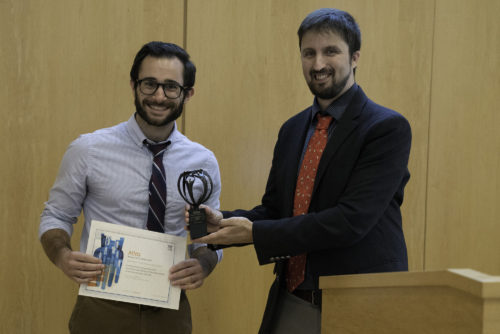
Postdoctoral fellow Matt Motta was honored with the Elsevier Atlas award for his article “Knowing less but presuming more: Dunning-Kruger effects and the endorsement of anti-vaccine policy attitudes,” published in August 2018 in the journal Social Science & Medicine. The Atlas “showcases research that could significantly impact people’s lives around the world or has already done so,” selecting one article each month from the thousands of recently published pieces in Elsevier’s 2,500 journals.
In the article, Motta and his co-authors, Timothy Callaghan and Steven Sylvester, conducted a survey of over 1,300 U.S. adults which asked questions about autism knowledge and attitudes towards vaccine and vaccination policies. Their analysis showed that more than a third of respondents thought they knew as much or more than doctors and scientists about autism. This overconfidence is highest in those with low knowledge about autism, and is associated with anti-vaccine policy attitudes and high support for nonexperts to have a role in vaccine policy-making.
In a presentation of the award at the Annenberg Public Policy Center, George Woodward, an Elsevier executive publisher, said the Atlas Award was given to a dozen studies a year out of some 400,000 published by Elsevier. The honored works, which come from a short list of finalists, are chosen by a group of board members from NGOs around the world.
As part of the award, the study has been made available through promotional access on Science Direct.
Motta, who received his Ph.D. in political science from the University of Minnesota, said, “My co-authors and I are truly honored to be selected for this award. Since publishing the piece, we’ve received requests for copies of the article on a weekly (and often) daily basis; from dozens of policymakers, journalists, researchers, and even concerned parents. We are thrilled to be able to share our work widely, with all who wish to read it.”
In selecting the paper, one of the Atlas advisory board members said: “The topic is critical, the problem is worldwide, the consequences are potentially huge and the solutions are scarce. More than just a dialogue about belief in immunization (which is already something) the paper addresses the broad question of relationship and trust between general population and experts, with an underlying lack of trust towards public political – and medical – authorities. The conclusions made were probably already known by many but to reinforce such an issue with this methods merits to be mentioned. In other words, this paper brings results far beyond the sole problem of the fall of immunization coverage; this is also a lesson for many public health decision makers.”

